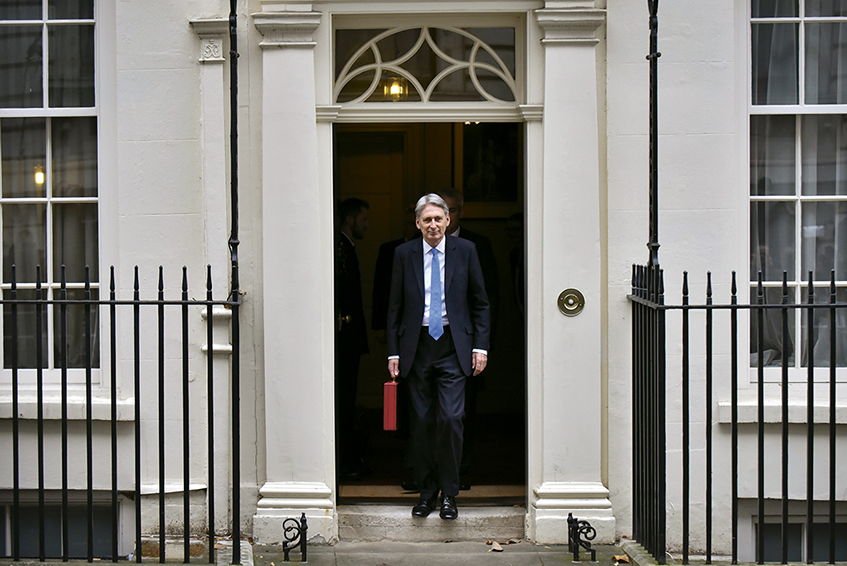Make or break Budget comes up short for the NHS
The Chancellor’s £2.8bn boost for the NHS is nowhere near enough to keep services running and meet the government’s own policy priorities, MiP and other experts have warned.

The reaction across the NHS community to the Chancellor Philip Hammond’s Budget on 22 November was almost universal: relief at some new money – and the (sort-of) end to the pay cap – laced with disappointment over the size of the investment and the many strings the chancellor attached. John Appleby, chief economist at the Nuffield Trust, probably summed it up best: “I’ve been asked if the glass is half-full or half-empty,” he said. “Frankly, I just think we need a bigger glass.”
The Chancellor used the old trick of adding together increases over several years with those already in the pipeline to claim he was raising the NHS budget in England by £7.5bn. In reality, it boils down to an emergency injection of £335m for the rest of this year, with £1.6bn extra next year and £850m of new money in 2019-20.
Hammond’s widely-welcomed plans for a £10bn capital investment programme also turned out to be somewhat less than advertised: only £3.5bn is new money from the Treasury – the rest will have to be raised from asset sales or private investors.
What’s more, the Treasury insisted the NHS funding boost was “exceptional” – one-off, non-cumulative increases to existing totals – leaving the funding position after 2020 uncertain. As for social care, it didn’t even merit a mention in the Chancellor’s speech.
Funding gap
The Budget was “yet another missed opportunity to pull health and care services back from the brink” said Niall Dickson, chief executive of the NHS Confederation. It leaves NHS funding growing at just 1.4% above inflation up to 2020, way below the historical average of 4%, and at a time when the need for investment in innovation, system change and infrastructure has never been greater. “It was better than we expected but it does not begin to take account of the enormous challenges we face in the next few years,” Dickson added.
Two weeks before the Budget, the King’s Fund, the Health Foundation and the Nuffield Trust published a joint report on NHS funding. They concluded that the NHS needed £4bn next year alone, just to maintain existing services, and that the potential funding gap by 2022–23 was approaching £20bn. In a speech on 8 November, NHS England chief executive Simon Stevens indicated that he agreed with the report’s analysis of the funding position.
MiP said the Chancellor was “failing to fund the health and care needs of our citizens” and warned it was managers who would have to make the tough calls. “The extra money in today’s Budget for the day-to-day running of the NHS falls well short of expert recommendations, and there’s nothing at all to relieve the crisis in social care,” said MiP chief executive.
“We will now see two things: longer waiting lists, and managers having to make more decisions about what the NHS can no longer do safely – or can no longer do at all,” he added. “NHS staff will be under even more pressure than they are already.”
Storing up trouble
Of the £1.6bn extra cash for next year, £1bn was earmarked by the Chancellor to tackle waiting lists for elective surgery, with the remaining £600m to be spent on reducing A&E waiting times. Speaking at a BMJ webinar the day after the budget, Anita Charlesworth, director of research and economics at the Health Foundation said: “The money offered will probably help with emergency care, but the real issue is when patients are admitted to hospital from A&E. And it won’t be enough to tackle waiting lists – we’re missing the 18 weeks more or less everywhere at the moment.”
She warned that with all the new money going to acute hospitals, services like mental health and community nursing would suffer. “We’re not being honest with the public about what can be delivered,” she said.
The Nuffield Trust’s John Appleby warned that, as well as reducing some services, hospitals and other providers would continue to overspend as they have in recent years. “Hospitals are printing their own money to some extent. They don’t have to break even by law and people can’t be turned away at the door,” he said.
The need for tough choices and trade-offs was emphasised by the chair of NHS England, Sir Malcolm Grant. While acknowledging that the extra money in the Budget “will go some way to filling the widely accepted funding gap”, Grant warned that “we can no longer avoid the difficult debate about what it’s possible to deliver for patients with the money available.”
Experts were particularly critical of the Chancellor’s failure to come up with extra money for social care. “It’s a serious omission,” said Appleby. “Our estimate is that the funding shortfall for social care is around £2.5bn, probably more.” Playing off one part of the health and social care system against another “was a dangerous game,” he warned.
Charlesworth said the government’s failure to properly fund services like social care and housing simply put more pressure on the NHS: “It’s bad economics and it’s bad for people. We need to end the zero-sum game between public services.”
She called for a new independent body – modelled on the Office for Budget Responsibility (OBR) – to identify the UK’s long-term health and care needs and work out the funding needed. “We need to move away from the boom and bust that has bedevilled our funding. The OBR has improved the quality of debate and made it harder for politicians to duck the difficult questions,” she said.
Caps off, but only two cheers
Chancellor Philip Hammond promised extra money in the Budget to fund pay rises for most NHS staff, effectively lifting the seven-year cap on NHS pay. But the new money is conditional on agreement between employers and unions on reforms to the Agenda for Change (AfC) pay system, to “enable” increases in productivity and “improve” recruitment and retention.
Hammond said he would fund settlements recommended by the NHS Pay Review Body in 2018, provided the talks “bear fruit”. NHS employers and unions, including MiP, have already agreed “broad principles” on a “refresh” of the AfC pay system, but talks have stalled recently because of the lack of funding for reforms.
The Treasury confirmed that pay rises above 1% for doctors and very senior managers, who are not on AfC contracts, would have to be paid for out of existing budgets.
MiP has campaigned strongly for the Treasury to fund a fair pay rise for all NHS staff, most recently by pressing MPs on the issue at the union’s parliamentary reception on 31 October.
“We welcome the promise of extra funding for a pay rise for Agenda for Change staff,” said MiP chief executive Jon Restell. “However, there is much work to be done by the Pay Review Body, unions and employers before we achieve a fair settlement. No one should be counting any chickens.”
Nuffield Trust chief economist John Appleby said the government was looking for a “something for something deal” on pay. “What do they mean by productivity? I think they mean ‘your terms and conditions will have to change’. I think they will probably be looking at progression up the pay spine, or something like that, and saying that has to change.”
Related News
-

Strange ways, here we come
Creating a ‘neighbourhood NHS’ will demand a different mindset, unfamiliar ways of working and difficult decisions on finances and staffing. Middle managers as well as senior leaders will play a big part in making it happen, writes Nigel Edwards.
-

Labour’s reforms: a mixed bag for managers
Ahead of the ten-year plan, Wes Streeting and NHS leaders have been sketching out some ideas for NHS reform. Jon Restell and Rhys McKenzie explain what these initial proposals could mean for managers.
-

Jon Restell’s Leading Edge | Giving managers legitimacy is the key to making reform work
The false trade off between the frontline and everybody else has become a deep-seated belief in a two-tier workforce. The health secretary needs to unite all NHS staff and give managers permission, encouragement and the tools they need to get his reforms off the ground.